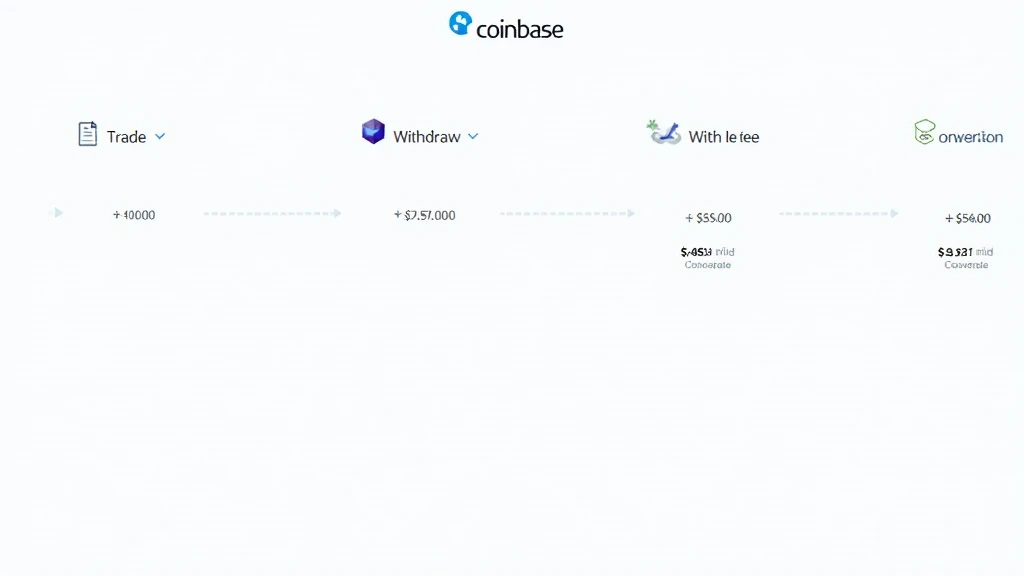Introduction
In the world of cryptocurrency trading, understanding the costs associated with payment processing is crucial. In 2024 alone, over $4.1 billion was lost due to exploits and hacks in decentralized finance (DeFi). With the rise of digital currencies, it’s important to grasp how platforms like Coinbase charge for processing payments, as these fees can significantly affect both individual investors and businesses utilizing crypto as a payment method.
Coinbase, as one of the leading cryptocurrency exchanges globally, plays a pivotal role in facilitating transactions that involve a plethora of cryptocurrencies. Understanding their crypto payment processing fees is essential for anyone looking to maximize their investments or leverage cryptocurrencies in business transactions.
What Are Coinbase Crypto Payment Processing Fees?
When dealing with cryptocurrencies, transaction fees are an inevitable aspect of the process. Coinbase charges users in two primary ways:

- Spread: This is the difference between the buy and sell prices of a cryptocurrency. Coinbase applies a small markup on the market price when you make a purchase.
- Transaction Fee: Coinbase also imposes a flat transaction fee on trades based on the amount being transacted. This fee can vary by region and currency.
Coinbase’s fees are designed to cover the operational costs incurred while processing transactions. With the growing user base in Vietnam, where cryptocurrency adoption has increased by approximately 28% in the last year, understanding these fees is more critical than ever.
Types of Fees on Coinbase
Let’s break down the various fees that users might encounter when making transactions on Coinbase:
1. Trading Fees
Trading fees are applied when users buy or sell cryptocurrencies. As mentioned, these include a combination of the spread and a transaction fee. The total cost will depend on the amount and the type of cryptocurrency being traded. Typically, this fee is around 1.49% for standard trades made on Coinbase. Advanced traders using Coinbase Pro may incur lower fees, typically ranging from 0.05% to 0.50%.
2. Withdrawal Fees
When you wish to withdraw your funds from Coinbase back to your bank account or external wallets, you may also encounter withdrawal fees. These fees can vary based on the currency or method selected. For instance, withdrawing Bitcoin to an external wallet incurs a network fee that varies depending on the blockchain congestion.
3. Conversion Fees
Should you choose to convert your cryptocurrency into fiat or another cryptocurrency on Coinbase, you may be subject to conversion fees. Typically, these fees are included within the spread, but they can also be considered as additional costs to watch for.
How Do Fees Impact Your Investments?
Understanding the fee structure on Coinbase can significantly impact your overall investment strategy. Here’s what to consider:
- High Turnover Trading: Frequent trading can lead to increased fee accumulation. Opting for a pro version of the platform can save you a considerable amount in fees.
- Long Term Holding: If you plan to hold your cryptocurrency long term, the initial fees may be more palatable in the grand scheme of your investment strategy.
It’s essential to factor in these processing fees when deciding how much cryptocurrency to buy or sell and how often. These costs can eat into potential profits or inflate losses, especially in a volatile market characterized by fluctuating prices.
Navigating Fees in the Context of Cryptocurrency Adoption in Vietnam
Vietnam has shown remarkable growth in cryptocurrency adoption, leading to a surge in users on platforms like Coinbase. With an estimated 12 million cryptocurrency users in Vietnam, understanding how transaction fees affect local investors is crucial. The rising economic landscape presents unique challenges and opportunities, particularly surrounding fee structures.
As the Vietnamese government continues to embrace blockchain technology, regulatory environments will evolve. This shift can influence transaction costs and the overall profitability of using exchanges like Coinbase for local users. Additionally, understanding local currency dynamics, such as the exchange rates of the Vietnamese Dong, becomes fundamental when analyzing transactional fees.
Future Predictions: Will Fees Change?
With evolving regulations and market conditions, it’s anticipated that Coinbase crypto payment processing fees will adjust in response to various factors, including:
- Technological Advancements: As blockchain technology improves, transaction costs may decrease, benefiting users.
- Regulatory Developments: Future regulations could mandate transparency and fairness in fee structures, possibly resulting in lower costs for end-users.
In conclusion, as cryptocurrencies become increasingly mainstream, there’s a possibility that Coinbase will revamp its fee structure to remain competitive while catering to its growing user base, particularly in regions experiencing high adoption like Vietnam.
Conclusion
Understanding Coinbase’s crypto payment processing fees is paramount for anyone involved in cryptocurrency trading or transactions. By familiarizing oneself with the costs associated, users can make informed decisions that could mean the difference between a profitable endeavor and one fraught with unexpected expenses. The Vietnamese market, with its impressive growth in cryptocurrency adoption, offers both challenges and opportunities in navigating these fees.
By being aware of trade and withdrawal fees and taking into account the rapidly evolving regulations, users can strategize effectively, maximizing their investment potential in the increasingly competitive crypto landscape.
Explore more about the intricacies of cryptocurrency trading and associated costs on cryptocoinnewstoday.
Authored by Dr. Tran Minh Hoa, a blockchain security expert with multiple publications in the field, specializing in decentralization and transaction verification audits.





